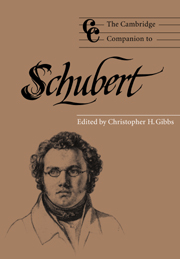Book contents
- Frontmatter
- Introduction: the elusive schubert
- Part I Contexts: musical, political, and cultural
- Part II Schuberts music: style and genre
- 6 Schubert's songs: the transformation of a genre
- 7 Schubert's social music: the “forgotten genres”
- 8 Schubert's piano music: probing the human condition
- 9 Schubert's chamber music: before and after Beethoven
- 10 Schubert's orchestral music: “strivings after the highest in art”
- 11 Schubert's religious and choral music: toward a statement of faith
- 12 Schubert's operas: “the judgment of history?”
- Part III Reception
- Notes
- Index
12 - Schubert's operas: “the judgment of history?”
from Part II - Schuberts music: style and genre
Published online by Cambridge University Press: 28 September 2011
- Frontmatter
- Introduction: the elusive schubert
- Part I Contexts: musical, political, and cultural
- Part II Schuberts music: style and genre
- 6 Schubert's songs: the transformation of a genre
- 7 Schubert's social music: the “forgotten genres”
- 8 Schubert's piano music: probing the human condition
- 9 Schubert's chamber music: before and after Beethoven
- 10 Schubert's orchestral music: “strivings after the highest in art”
- 11 Schubert's religious and choral music: toward a statement of faith
- 12 Schubert's operas: “the judgment of history?”
- Part III Reception
- Notes
- Index
Summary
When Fierrabras (D796), Schubert's last completed and best opera, received its Austrian premiere in 1988, the Frankfurter Allgemeine Zeitung proclaimed in its bold headline: “against the judgment of history: Schubert's ‘Fierrabras’ rescued triumphantly.” Although not all critics agreed, the headline succinctly captured the issues at stake in the Austrian premiere of Fierrabras, and indeed in any modern consideration of Schubert's operas in general. For “history” – some notable voices aside, such as Maurice J. E. Brown and Elizabeth Norman McKay – has generally judged Schubert a failure as an opera composer. The Vienna Fierrabras revealed the risks of making such judgments without experiencing these works in the theater.
With the exception of three commissioned works, Schubert's theatrical works were neither performed during his lifetime, nor for a long time afterward. While some of his Singspiels have enjoyed intermittent exposure, his “grand” operas have almost never been performed in their original form. For example, there have been performances of a work such as Alfonso und Estrella (D732) in abridged versions (Franz Liszt, Weimar, 1854), freely adapted versions (J. N. Fuchs, Vienna, 1882), bowdlerized versions (Kurt Honolka's Die Wunderinsel, 1958), and concert versions. Recently, there have even begun to be full performances, although Alfonso, unlike Fierrabras, has not yet made it to a major international opera house. In short, the generally negative body of received opinion about Schubert's operatic talent and accomplishment remains largely untested in the theater.
- Type
- Chapter
- Information
- The Cambridge Companion to Schubert , pp. 224 - 238Publisher: Cambridge University PressPrint publication year: 1997
- 1
- Cited by



